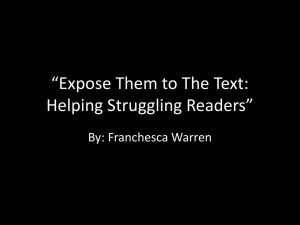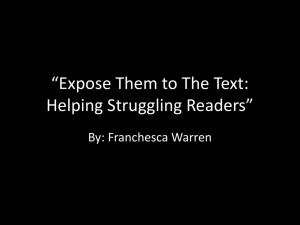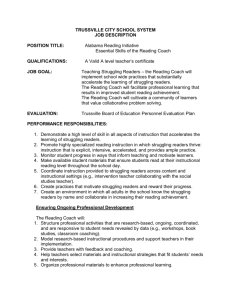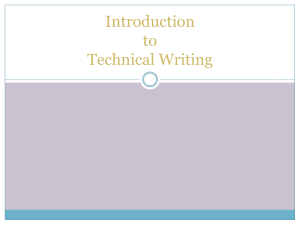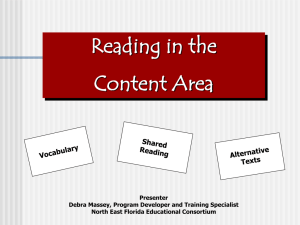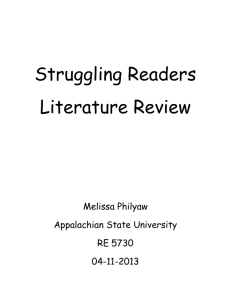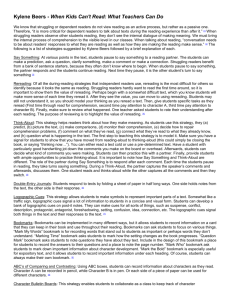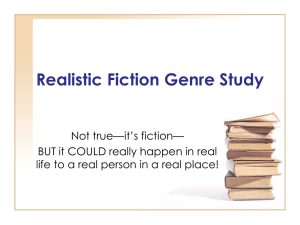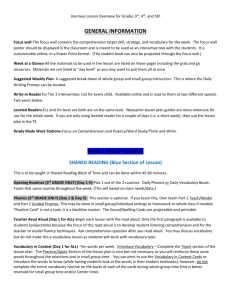PDE requires districts to implement PA Common Core standards by
advertisement
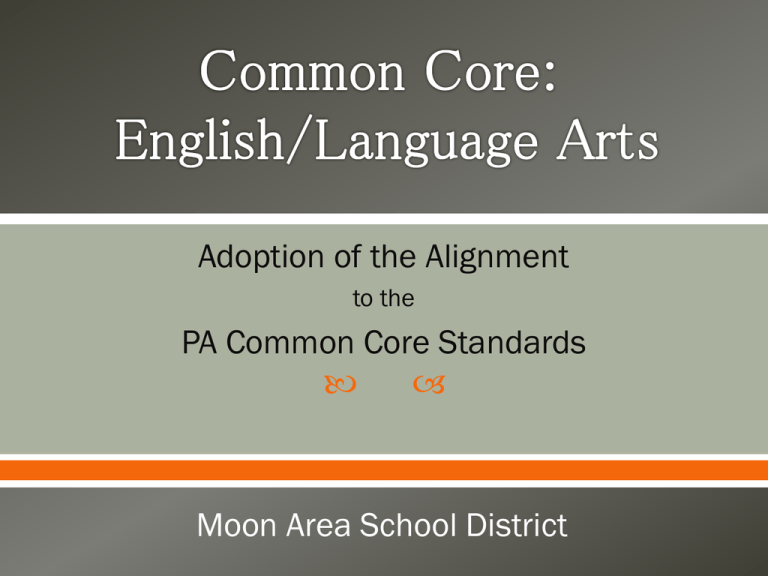
Adoption of the Alignment to the PA Common Core Standards Moon Area School District Content standards: describe what students should know and be able to do throughout the pre-kindergarten – 12 continuum Targets for instructional mastery, essential for success in all academic areas A “staircase of complexity” to enable students to graduate “college and career ready” 1) 2) 3) 4) 5) Foundational Skills (Pre K – 5) Reading Informational Text Reading Literature Writing Speaking and Listening *The full set of PA Common Core Standards may be reviewed on the MASD Curriculum Portal. • • • • • Professional Development Curriculum review and analysis by grade level Identify transition needs by grade level Determine proposed solutions to address needs at all grade levels Public review & Board adoption PDE requires districts to implement PA Common Core standards by July 1, 2013. • • • Curriculum Writing (Summer 2013) Implementation (Fall 2013) Review & Revise as necessary (Summer 2014) “Children who are particularly likely to have difficulty with learning to read in the primary grades are those who begin school with less prior knowledge and skill in relevant domains.” –Snow, C. E. et al. (1998) Preventing reading difficulties in young children. National Academy Press. Washington, DC. • Building awareness: Pre K standards included in 2012-2013 Child Find publication • Forming Partnerships: Pre K Summits & Fair (Received $800 grant to cover costs) • Encouraging Early Learning: Distribution of Lexia® accounts to Moon Area Pre-K students • Through Moon Area preschool programs • Through Kindergarten Round-Up • On request Early Intervention for struggling readers Increase reading of informational text (non-fiction) Increase writing with robust vocabulary Increase emphasis on grammar Increase use of differentiated instruction strategies Moon Area School District’s Goal All students will read on or above grade level by the end of 3rd grade so they may successfully make the transition from “learning to read” to “reading to learn.” “Children who will probably need additional support for early language and literacy development should receive it as early as possible.” – Snow, C. E. et al. (1998), p. 9. Early Intervention for Struggling Readers There were discussions with administration and Title I teachers about thetypes of reading programs available for MASD learners. Continuation of current Title I reading program strategies which included leveled intervention with targeted students per diagnostic analysis Revising the current Title I reading program model to determine what researched-based intervention would be compatible with the MASD student population Aligning the decision to the design of the Common Core for Language Arts Early Intervention for Struggling Readers A Pro and Con list was developed to further determine what programs looked like in the school districts that were visited The Pro and Con list was shared with administration and Title I staff to make a determination on the type of program to implement School visits were conducted to allow Title I teachers and administration to see the reading programs in action Early Intervention for Struggling Readers Early Intervention for Struggling Readers Wilson Fundations® by Wilson Language Corporation Site visit was conducted at Chartiers Valley School District on 2-28-13 Leveled Literacy Intervention by Fountas and Pinnell Site visit was conducted at Quaker Valley School District on 2-22-13 Early Intervention for Struggling Readers Pros Phonics-based and builds on literacy objectives as outlined in the Common Core State Standards Clear progress monitoring establishes goal success Multi-sensory lesson delivery Targets specific areas of need There is a writing journal encouraging a connection between reading and writing Training is appropriate and meets the needs of teachers Can be implemented by the special education staff Cons Consumables are needed yearly in order to implement the program successfully Early Intervention for Struggling Readers Pros Engaging lessons utilizing the leveled readers which encourages students to attend to the text Writing booklet- encouraging a connection between reading and writing Special education teachers can also use the program with their students Cons Not strong in the phonics development area The teacher will need to supplement their phonetic instruction Wilson Fundations® best supports the learners in the MASD for the following reasons: Phonics development Connections established between phonetics and writing Structure provides consistency across the District and optimizes student growth Multi-sensory presentation and practice of information Early Intervention for Struggling Readers Early Intervention for Struggling Readers Curriculum $2514 for 60 hrs. Materials $24,000 serving 250 students/yr. Professional Development $10,400 for 6 days *Reoccurring cost of consumable materials: est. $2800/yr. • Reading a-z.com: Subscription to Common Core Aligned Resource Portal • Grades K-5 • Regular, special, and gifted education • Cost: $5000/year for 80 teachers impacting about 1,800 students! • Multi-year licensing agreements offered at discounted rates. If the link to pay the video above does not work , please visit www.readinga-z.com , and click the “Take a Tour” video located in the upper right section of the webpage. Earth - $5.21/student Pittsburgh’s Rivers - $16.49/teacher Polar Mammals - $5.21/student Who Was Walt Disney? - $3.74/student Total Cost - $4347 $11.96 • Rivers: Nature’s Wondrous Waterways $4.49 • What Happens to Our Trash? $3.74 • Who Was Albert Einstein? $3.74 • Who Was Roald Dahl? $3.74 • Who Was Steve Jobs? $22.46 • Exploring Ecology $23.49 • Poetry Lessons to Meet the CC State Standards $13.46 • Z Is for Zeus: A Greek Mythology Alphabet Total - $2381 • Kindergarten: My Word Book • ($50.40 /set of 25) • 1st & 2nd: Words I Use When I Write • ($53.63/set of 25) • 3rd & 4th: More Words I Use When I Write • ($61.95/set of 25) “Primary-grade children should be expected to spell previously studied words and spelling patterns correctly in their final writing products. Writing should take place regularly and frequently to encourage children to become more comfortable and familiar with it.” -Snow, C. E. et al. (1998), p. 8. Utilize tools free online o FunEnglishGames.com o Funbrain.com o Chompchomp.com Consistent use of consumable grammar workbook Strengthen degree of mastery Analyzing information from multiple sources on the same topic Supporting claims with credible evidence, with consideration to opposing viewpoints Linking digital publications to sources Analyzing the impact of multimedia information on a verbal or written message Updated Teacher’s edition online – for supplemental PA CC resources (6-year subscription provided free of charge) Winter Keystone Literature Exam Designed to align to a 10th grade PA CC curriculum as an “end of course” exam All juniors participated in December Over 90% earned proficient scores All K-12 English Language Arts courses will be aligned to the PA Common Core State Standards. o On Hands Schools will import the new PACC standards into our documents according to the PA Standards Crosswalk, saving us $5000 in curriculum revision costs. o Cost of curriculum writing for new courses and nonfiction units: $3352. K-3 Reading Intervention – Wilson Fundations o Materials: $24,000 o Professional Development: $10,400 o Curriculum writing – accounted for in above total Nonfiction units for grades 3 & 4: $6728 Writing/Vocabulary Journals: $2157 PACC resources for Differentiated Instructional strategies o Reading A-Z.com subscription: $5000/year Total Costs for PA Common Core Transition: $51,637
